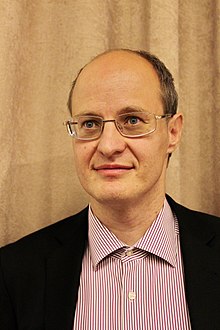Levente Gyöngyösi
Levente Gyöngyösi (born 1975, Cluj-Napoca, Romania) is a Romanian-born Hungarian composer. He moved to Hungary in 1989, when he was 14.[1]
Levente Gyöngyösi | |
|---|---|
 Image: László Horváth | |
| Background information | |
| Born | 1975 (age 48–49) Cluj-Napoca, Romania |
| Occupation(s) | Composer, Film composer |
Works, editions and recordings[edit]
- Opera A gólyakalifa (The Stork Caliph) after the novel of Mihály Babits. Hungarian State Opera, May 2005.
- Assumpta est Maria for mixed choirs
- Két keserû népdal ("two bitter folksongs") for mixed choir
- Salve Regina for soprano solo, female choir and two instruments
- Vanitatum vanitas for female chorus (2001)
- Missa Lux et Origo for female choirs (2004)
- Verkündigung ("Annunciation"), symphonic cycle in five movements (2003)
- oratorio Canticle of the Sun, Budapest Spring Festival (2004)
- Te lucis ante terminum
- Confitemini Domino for female choirs
- Dixit in corde suo for mixed choir and drum (2012)
- Concerto for Piccolo and Orchestra. Composed for, premiered, and recorded by Peter Verhoyen (2022)[2]
- He also wrote 4 symphonies – the 3rd Symphony with soprano solo is named Birth; the 4th Symphony is named Az Illés szekerén ("On Elijah's Chariot", after a poem by Endre Ady) – and a Sinfonia Concertante for percussion group and orchestra.
